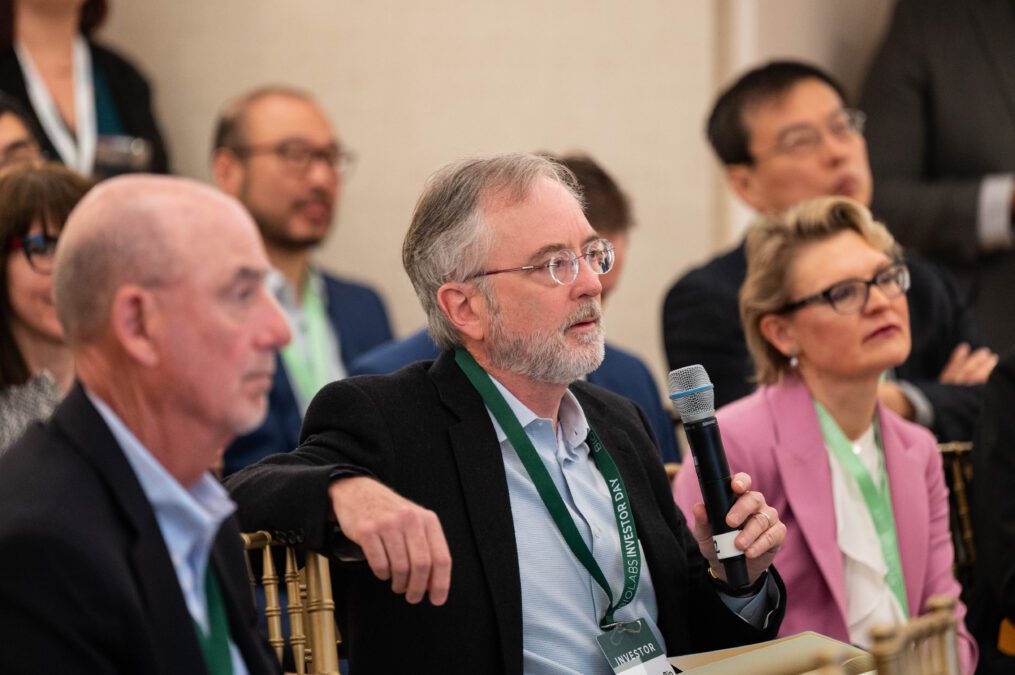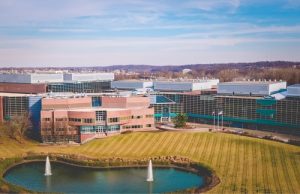
Philadelphia BioLabs Investor Day Fosters New Connections for Local Entrepreneurs
By Bryan Spiegelberg
May 10, 2023
At the tail end of April, BioLabs convened an event that brought together money-hungry Philly-area life sciences start-ups with venture capital firms looking to support breakthrough technologies.
The event also served as a showcase of the venue – The Curtis, a revitalized mixed-use facility that connects a history steeped in American life with a future steeped in life sciences innovations.
The Curtis has more than 300,000 square feet of cutting-edge lab space. To kick off Investor Day, Bill Glazer, CEO of Curtis developer Keystone, emphasized the features that make The Curtis an ideal destination for early and growing life science and CGT companies. He described the optimal infrastructure, adapted from a facility purpose-built to accommodate the huge vibrating printers that cranked out millions of issues of Saturday Evening Post and other Curtis Publishing Company mainstays.
Glazer also described the benefits of the energetic scientific ecosystem in the building and the region – “Look around you… you’re sitting in a network of some of the most compelling future and current scientists and scientific investors. This kind of community inspires greatness.”
Many of the lab spaces at The Curtis have been fitted out by BioLabs, a global network of shared scientific spaces designed to accelerate innovation by life sciences start-ups. Notably, BioLabs offers more than just lab space. Customers have access to a wide range of services, including a new proprietary procurement system, that save them time and help them focus on the science.
The event
According to Melina Blees, PhD, Site Director of BioLabs Philadelphia and organizer of BioLabs Investor Day, a key goal of BioLabs is to encourage start-up success by enabling strategic connections. These connections help to strengthen ecosystems in The Curtis and similar facilities across the globe, and their dedicated efforts to facilitating connections between growing companies and sources of capital smooths the often rocky path to success.


(SOURCE: BioLabs)
Investor Days, held in multiple venues around the world, offer a prime example of these integrated networking services. The event in Philly, which was co-sponsored by the Center for Breakthrough Medicines, welcomed 200 attendees who networked over breakfast and lunch and watched Shark Tank-style pitches by growing companies at the cutting edge. Particularly interested in these pitches were dozens of investment firms, both local investors and investors looking to gain a foothold in the Philly life sciences scene. These investors were considering providing seed capital through Series B financing.
“We’ve been thrilled by the response to the event — it underlines the outstanding quality of startups in Philly, and the need for investors to have a real presence in the city,” said Blees. “It’s great to see that BioLabs’ global relationships with VCs and pharma are proving so valuable to this ecosystem. We’ve already heard from many of our participating investors that further conversations with individual startups have come out of this year’s event, and those are just the follow-ups we know about!”
The pitches
Investors heard pitches from a diverse group of companies who were chosen by BioLabs following an application process. The program included companies throughout the start-up life cycle with diverse deliverables — including orally available small molecule inhibitors, disposable and durable medical devices, CGT and immunotherapy technologies, and computer tools based on artificial intelligence and machine learning.
Here are just a few of the exciting new companies that are part of the promising future of the Philly life sciences scene.





(SOURCE: BioLabs)
Aro Biotherapeutics
W. Alex Meltzer, Director of Corporate Strategy, took the elevator down from Aro’s headquarters on the 7th floor of The Curtis to describe the company’s scientific and business strategies. Aro, a J&J spinout company, is building on the revolution in RNA therapeutics, which according to Meltzer has led to “fundamental changes to the way we think about therapeutics.”
The vast promise of RNA therapeutics to target diseases previously considered undruggable has been hampered by the poor efficiency with which RNA agents enter cells and their rapid systemic clearance.
Aro’s strategy combines RNA therapeutics with protein engineering. Their key platform involves conjugating therapeutic RNAs to Centyrins, which are small and stable proteins that can be tuned to seek out target cells, thus greatly enhancing delivery. Their current therapeutic focus is the muscle-specific delivery of a siRNA aimed at glycogen synthase 1 for the treatment of Pompe disease, which is characterized by a toxic accumulation of glycogen.
SFA Therapeutics
This Temple University spinout, headquartered in nearby Jenkintown, is aiming at the “root cause of auto immune disease.” According to SFA CEO Ira Spector, current treatments for autoimmune diseases simply “dumb down” the immune system, leaving patients vulnerable to infection.
Instead, SFA’s oral agent has a broader immunomodulatory activity that inhibits the production of key cytokines but that also supports the expansion of regulatory T cells. This agent is currently undergoing Phase 1b trials, and Spector presented several success stories that suggest that their agent may have lasting effects in psoriasis. The company also predicts that this strategy will be effective in multiple related disorders, providing another all-important differentiation from competitors.
Ventru
According to co-founder and CEO Bryan Humbarger, one of the most common neurosurgical procedures has been performed essentially the same way for more than a century. In this technique, which is often performed at the bedside in the ER, a neurosurgeon places a device through the skull into the brain ventricles to drain excess cerebral-spinal fluid.
This surgery clearly carries a high risk of collateral damage; Penn neurosurgical residents Rachel Blue and Michael Spadola thought that there must be a better way. The team developed the Device for Intraventricular Entry (DIVE), a stereotactic guide that facilitates the process and directs accurate catheter placement.
Early studies suggest that the device will greatly reduce the number of passes needed for effective catheter placement.
Humbarger told investors that this relatively small, simple, and effective tool will be needed by hundreds of thousands of patients per year.
FloBio
Information can be a key limiting resource when it comes to the split-second decision-making that occurs in acute care situations. Information is particularly important when it comes to bleeding – in the worst case, critical interventions may need to be made blindly with regard to clotting disorders or the use of anticoagulants. This situation has been made particularly serious with the growing use of new hypereffective direct oral anticoagulants that are becoming a mainstay of cardiovascular care.
CEO Jerri Ann Thatcher described FloBio’s new tool to rapidly fill in this information gap. Their point-of-care fluidic diagnostic platform has the capability to provide clinicians with insight into patient coagulopathies or the use of anticoagulants that may need to be reversed.
FloBio, headquartered in the Pennovation Center, is led by a world-class team of scientists and business developers with deep Philly roots.
BioCurie, Inc.
Irene Rombel, CEO of BioCurie, pitched her company’s position at the “nexus of AI and CGT.”
CGT is of particular importance in Philly, which is widely known as “Cellicon Valley” and is the home of founding scientists and breakthrough companies in the field. Rombel recognized the transformational significance of CGT, but she also noted that the complexity of the technology combined with its explosive growth have led to a crisis in CGT production. Bottlenecks and inefficiencies in the production of the materials needed for these sophisticated therapies cost the system billions of dollars annually.
Enter AI. According to Rombel, the BioCurie intelligent software platform can optimize conditions for the production of cell, gene, and RNA therapeutics, lowering manufacturing costs and freeing up time and resources for research and development. The software uses proprietary technology to scrape data from a variety of sources, including scientific literature and patents and real-world patient data from collaborators.
The beauty of the use of AI in this context is that its performance will be expected to become even better over time.
While Delaware-headquartered BioCurie is still in its early stages, Rombel sees the potential for profitability by year 3.
The Takeaways
Unlike a television reality show, at The Curtis discussions between start-ups and investors took place behind the scenes, and investment decisions will not be made public for quite some time.
However, we predict that many of the companies will make it to the next level as a result of connections made at Investor Day – keep an eye on BioBuzz for the latest news on these and other companies that call Philly home.










